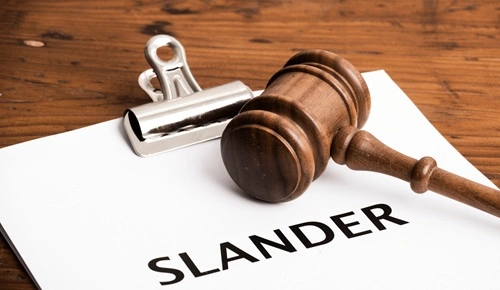Yes, in a way, Slander is illegal because it is a form of defamation, and someone can quite literally sue you for it. So technically, it is illegal, and you can get in legal trouble for doing something like this. But, there is much more to this whole Slander thing, and we advise you to at least know it a little better to know whether you’re in the safe zone or not, or maybe you’re dealing with this Slander situation and want a way out. Just keep on reading then.

What’s Slander, Anyway?
Alright, without beating around the bush, let’s just say that one of the main ways that defamation can come about is through the case where a person makes false statements about another person in such a way that his/her reputation is harmed. Simply put, it is a case of personal verbal communication and not something that has been digitally published or printed.
Let’s say a person publicly claims that you were fired for stealing, even if it is not true, then that is slande.
But, please don’t mix it up with gossip or simple opinions. Slander is all about untrue stories that are presented as facts and that actually cause you damage, for example, if you lose your job, business, or good name because people have trusted the very lie spread about you.
Slander in the U. S. is considered defamation, the main idea of which is the false patterns of words either in speaking or writing that harm the reputation of a person. If the words are spoken, then it’s slander. In case they’re written, it’s libel.
Slander vs. Libel: What’s the Real Difference?
Both slander and libel damage the image of a person with pure lies; the main difference between the two is the way the defamatory statement is disseminated.
Slander is a defamation spoken in front of a group, maybe at work, during a meeting, or even in front of a people. As words are not recorded, it is a little harder to prove that you have been slandered.
When it comes to libel, it is basically the writing or posting of false statements in articles, blogs, or social media posts, etc. Since these defamatory statements are persistent, libel cases can typically be demonstrated with greater ease.
Just because slander is “only words” doesn’t mean you should take it easy. It still has the power to harm a person deeply and can even affect their finances.
So, Is Slander Illegal in the U.S.?
Here’s the situation in the country: defamation is not a crime in the United States. It is not the case that you telephone the police and have someone taken into custody because of it. Nevertheless, it sure is against the law in a civil manner, which implies that you may take the person who disseminated the untruthful information to court.
In case you win, they may be required to pay you for the emotional damage that was caused, like emotional distress or loss of income, that’s very much a possibility. Laws about slander are there only to repair the damage done, not to punish offenders by sending them to jail.
Real-Life Slander Cases
One that is commonly known is Johnny Depp vs. Amber Heard. The court decided that several statements made by Heard were untrue and defamed Depp’s image; therefore, he was awarded compensation. Remember that one?
Another example was the lawsuit of David Schwimmer from Friends. A person alleged that he required costly presents in order to make a brief appearance at a charity event, absolutely untrue. Schwimmer took the defamation case to court and was awarded $400,000.













